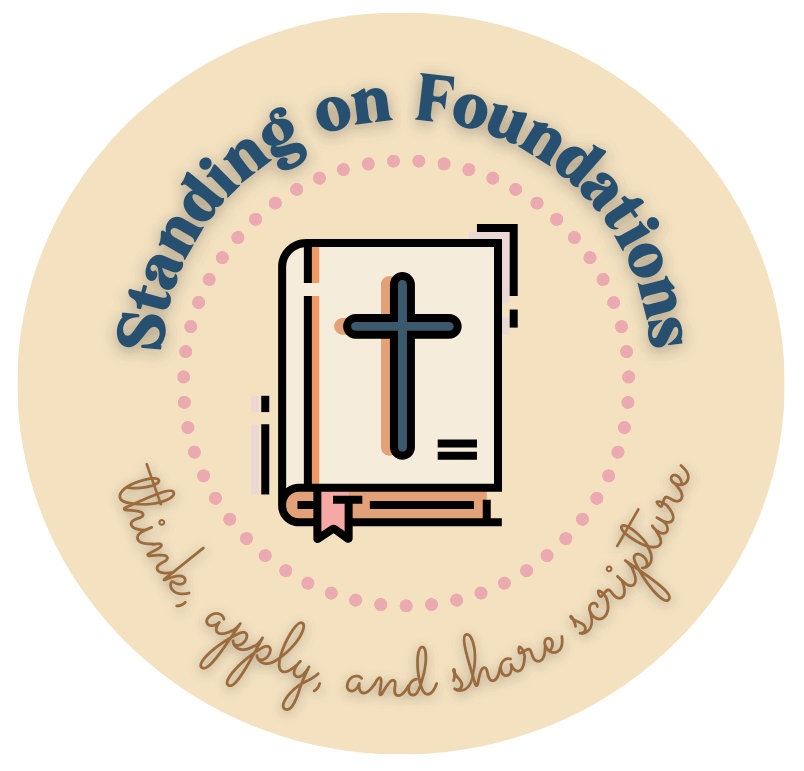What is the Bible About? Biblical Theology in Genesis
God’s plan is a cornerstone of our foundation, shaping and guiding everything we believe and do.
Let’s dive into the captivating world of storytelling. What is the Bible to you? Perhaps it’s the most profound story ever told—a story that shapes lives, gives purpose, and reveals truth.
When was the last time you watched a truly gripping movie? Are you a hopeless romantic, tissues ready, waiting for that tear-jerking reunion of two souls who overcame all odds to be together? Or maybe you’re a thriller fan, glued to the screen, holding your breath, ready to shout, “Don’t go in there!” as the main character inches closer to the unexpected danger lurking in the shadows.
Personally, I’m a sucker for true stories about resilience. There’s something powerful in watching a protagonist rise above impossible challenges, each setback taking them deeper into hardship, like standing at the base of Mount Everest with nothing but sheer willpower to climb. Yet, when they finally conquer their mountain, it stirs something universal in us—a reminder of human strength and spirit, of victory over adversity.
That’s the beauty of storytelling—it connects us, whether on the page, the screen, or even in the pages of the Bible. Each story speaks to the part of us that loves, fears, dreams, and hopes.
The Bible’s story stands apart. The main character—God—is never in a difficult position. Instead, the supporting cast, His people, face struggles and rely on Him to guide, redeem, and restore them.
We’re standing before a mountain as daunting as Everest—unprepared, without climbing gear, and utterly alone. No amount of effort, grit, or clever strategy can bring us victory. In the face of what the Bible calls sin, we cannot erase the debt we owe to God. Triumph isn’t something we can earn; it requires a solution beyond ourselves.
Understanding the Bible’s story and God’s plan is the first step in building on the basics of the Christian faith. God’s plan begins with, “In the beginning God…”

In this blog, I would like to share a bird’ s-eye view of God’s plan through the books of Genesis.
The Bible is often seen as a manual for living a good, godly life or as a guide for what not to do.
Though some of these things make up the Bible, Hebrews 1:1-3 tells us that the story is about God, revealing Himself first in shadows, types, patterns, and symbols (we will go in-depth later into these things) and finally in the person of Jesus Christ.
The plan of God is about His glorious grace to hell-bound sinners so that we might live to the praise of His glory. Understanding the plan of God gives us part of the framework for understanding the Bible and how it applies to our lives.
His story helps us answer questions like: Who am I? Why am I here? How do I answer the problem of evil? And what is my purpose? So, let’s begin at the beginning—in the beginning, God.
The Plan of God: Paradise Created
Genesis 1:1&2
“In the beginning, God created the heavens and the earth.” What’s significant about this verse?
God is making a dramatic statement, declaring Himself eternal, creator, and sustainer of all things.
He is the beginning of all things, the one who has always been, the one who created everything, and He is the one who has authority over it.
The first question we must ask ourselves is, whose authority will I follow, God or men?
Genesis 1:3-25
The second thing to observe is the distinct order of His creation. God created the form, filled it, and gave it a specific function and purpose.
If you read my blog “Why Foundations?” you know that I suggested that God’s Word has a set of directions. We see His sovereign control giving direction that actively sustains and directs each moment in history through the order of creation.
The late, great theologian R.C. Sproul, often said,
“If there is one maverick molecule in the universe, one molecule running loose outside the scope of God’s sovereign ordination, then ladies and gentlemen, there is not the slightest confidence that you can have that any promise that God has ever made about the future will come to pass.”

Genesis 1:10,12,18,21,25,31
The third thing we can learn about the plan of God is by emphasizing “it was good or very good.” Before the Fall, His perfect and holy character, worthy of all honor and praise, was reflected in the creation Psalm 19:1. God first revealed Himself in time and space through His creation. His story starts with Him; He is the focus, and His creation is to reflect what is the ultimate good: Himself.
Searching for answers to the Bible’s most essential questions? Click HERE to sign up for my FREE Bible Study and Workshop resources, covering topics like “Who is God?”, “Does God care about my suffering?”, “How to Approach Spiritual Warfare Biblically,” and much more.
The Plan of God: Paradise Lost
Genesis 3: 1-7
The Bible doesn’t tell us how soon after creation the fall of man occurred; however, we do have a clue. Genesis 1:28 tells us that God told Adam and Eve to be “fruitful and multiply”; however, no children had been born before the fall. Knowing that there were no children tells us paradise, as God created it, was short-lived. Satan came immediately to usurp God’s authority.
God’s authority and perfect and holy character are what Satan put on trial before Adam and Eve. Understanding God’s story requires us to have a proper understanding of sin.
Sin is often seen as what we do or don’t do. It is also seen as a mistake or, as society would say, “we are broken.” It wouldn’t be wrong to think of sin in some of these ways; however, these things are not the basis of the doctrine of sin. We want to understand how God defines sins.
Satan’s goal was not just to tempt Eve to the act of eating the forbidden fruit; instead, he wanted her to doubt who she knew God to be and to question His authority.
Sin is first an attack on who God is, and all He said is good (His authority and rule over creation).
Eve’s view of God changed; she no longer believed He was perfectly good, holy, and perfect in love. She no longer trusted His perfect authority but instead relied on her judgment.
The Apostle Paul gives us insight into a biblical understanding of sin in Romans 1:18-23 and Romans 3:10-18. He first tells us that God has revealed Himself in creation; man is without excuse in recognizing and offering praise and obedience.
Denying who God is and rebelling against His authority shows that we are not just lawbreakers but, by nature and in the totality of our being, are in rebellion against God.

One of the most common sins the Bible speaks about is idolatry. Idolatry is misplaced worship; it takes the worship that God is due and replaces it with something or someone else as the object of worship. His second point in chapter 3 is that our choice to rebel against God’s perfect and holy character caused a separation in our relationship with Him. It has become our nature to sin; in our fallenness, we desire to oppose God and His perfect law. There are no balancing scales of “good” and “bad”; our flesh is completely fallen.
Being completely fallen doesn’t mean we can’t do “good things,” but our good works can never repair our nature or relationship with God.
Our own merits can never cancel our debt to Him. God’s grace alone allows us to recognize the condemned verdict against us and the ability to turn to Him in faith.
Genesis 3:7-13
In his sinfulness, man is prone to shrink back in shame when caught in sin.
Guilt that doesn’t see the need for repentance results in misplaced shame.
People do not recognize that it is God first whom they have sinned against; instead, they focus their attention on burying their guilt and shame by repackaging it.
We dress it up, look for ways to find happiness despite it, or improve it. For Adam and Eve, the goal was no different. They chose to hide their guilt and, in their shame, made clothes of fig leaves. Knowing they were still guilty, they hid from God.
Hiding from God is not unique to human nature because the Bible teaches that God is the author and finisher of our faith. We are powerless apart from His grace to turn to Him in faith and repentance (John 6:44, Hebrews 12:2, Matthew 11:27).
Genesis 3:14-19
Adam and Eve depended on God to make the first move; in their strength, they were powerless to repent and turn back to Him in faith.
A second quality of human nature is a need for grace. Like us, Adam and Eve depended on God to extend grace, for apart from grace, we would remain in our sin 2 Timothy 1:9, Ephesians 2:4&5, Romans 6:14.
As an added consequence of sin, God first cursed His creation, the animals and the serpent. God explained to Satan, the serpent, that he would bear worse of the curse. All would know Satan as the one who first denied God’s perfect character and authority. (More on this later; note that Satan was created as a heavenly angel. His rebellion against God did not bring sin to the human race because He was not human.)
Next, God curses the woman, telling her that in pain, she would bring forth offspring who would be in continual war against the offspring of Satan (ones who reject salvation through Jesus Christ), and she would desire to rule over her husband.
God, in His mercy, would bring forth from her an offspring, one who would destroy Satan, though it would be in death that triumph would come forth.
To Adam, God would make the earth challenging to work on. The ground would be hard, and thorns would impede his ability to be fruitful. Work would no longer be a joy; instead, it would be a burden.
Physical death and spiritual death would be the final and eternal consequence of their action and would spread to the whole of humanity Romans 5:12.

Conclusion
You might be thinking, well, this is rather hopeless. Genesis 3:22-24, on the other hand, doesn’t leave Adam and Even without hope. Instead, God drives them out of the Garden of Eden and away from the Tree of Life. Why? The Tree of Life would have provided them everlasting life, and now that sin had entered the world, God, by His mercy, kept them from living eternally in their fallenness.
In the next blog, we will discuss the outworking of redemption, God’s answer to the problem of sin, and our final hope when we trust in Jesus.
Resources I recommend on Understanding the plan of God in Redemption
A Biblical-Theological Introduction to the Old Testament: The Gospel Promised
How to Understand and Apply the Old Testament: Twelve Steps from Exegesis to Theology


